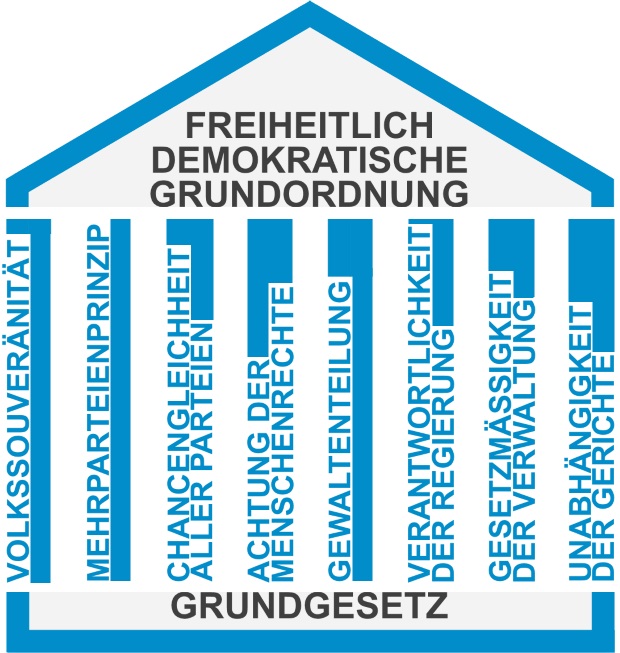Free democratic basic order

The free democratic basic order is mentioned in a total of eight places in the Basic Law for the Federal Republic of Germany. However, this does not contain a legal definition of what „free democratic basic order“ means. Such a definition is not found in the Act on the Federal Constitutional Court.
In fact, the importance of the basic order of the Federal Republic of Germany is emphasized by the two adjectives „liberal“ and „democratic“.
Liberal is the basic order that protects every human being from arbitrary state actions and guarantees state protection of human dignity (Article 1 of the Basic Law) and fundamental rights (Articles 2 – 19 of the Basic Law).
Democratic is the basic order that grants and guarantees every person considerable participation in society. The foundations of the right to participation are shaped by the possibility of any individual to be involved in decision-making which affects them.
Both of them together form the liberal democratic basic order as a key constitutional concept that determines the legislation of the federal government and the federal states, the essence of the political system and the values of the Federal Republic of Germany, in accordance with the highest and fundamental value principles that are at the heart of every democracy:
Democracy and the power of the people
According to the Basic Law for the Federal Republic of Germany, all state authority is derived from the people. It shall be exercised by the people through elections and other votes and trough specific legislative, executive and judicial bodies (Article 20). The people appoint representatives at federal, state, and local level in regular elections who represent the interests of the people and make decisions based on the majority principle.
Respect for fundamental rights
Fundamental rights enable every individual to defend themselves against their infringement by the state. The state must protect the fundamental rights of every person, but also against other people, organizations, and companies. Everyone is entitled to the free development of their personality. No one may interfere with the free self-determination of others, e.g. regarding religious activity and access to information, education and professional life. Men and women have equal rights.
Separation of powers
The principle of the separation of powers serves to inhibit and control state authority. By creating three competing branches, the separation of powers uses power of each independent branch to check and restrain the power of the other branches from abusing their power to detriment of fundamental rights and freedoms. In this way, there is a self-executing state authority emanating from the people that is exercised by special bodies of legislation (parliament), executive (government) and judiciary (courts). The parliament control the work of the government.
Rule of law principle
The principle of the rule of law ensures above all that the government and administration comply with the law and that there is judicial protection in any case of violations of the law by public authorities. Every citizen has access to the courts.
Legality of the administration
Administration must observe and apply the law. Measures that interfere with citizens‘ rights must be justified by a legal basis that permits or authorizes such measures.
Independence of the courts
The courts are independent. They cannot be controlled by government or parliament. Judges are only bound by their conscience when applying the law. Every citizen has a right to a fair trial.
Multi-party principle and equal opportunities for political parties
An essential feature of the free democratic basic order is that there are different political parties. All parties have the same opportunities to put their political ideas and concepts into practice. The establishment, existence and activities of parties are free from any state influence and interference. In elections, all parties have the same opportunities to campaign and be elected. The multi-party principle ensures diversity of opinion in public life.
Right to form and exercise an opposition in accordance with the constitution
The opposition forms the political counterweight to the government and has the task of controlling it. It can introduce bills. The government may not obstruct the opposition in its work.
Further helpful links that we have listed for you: